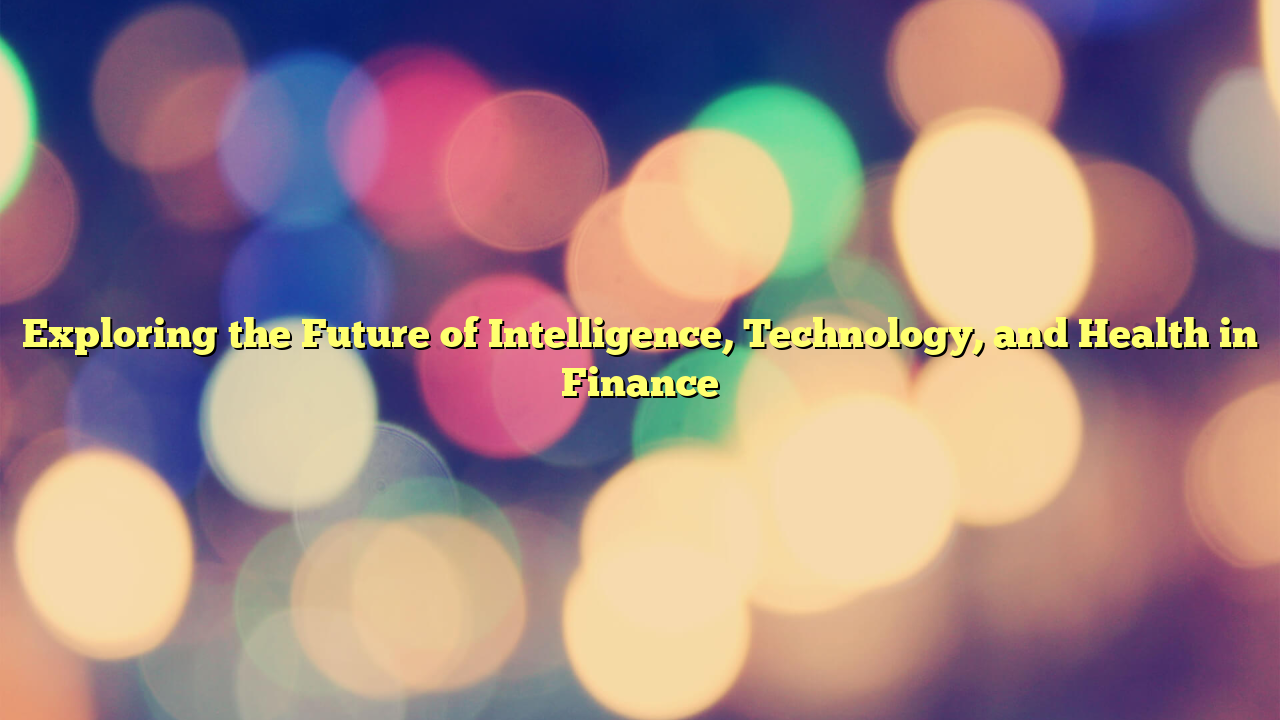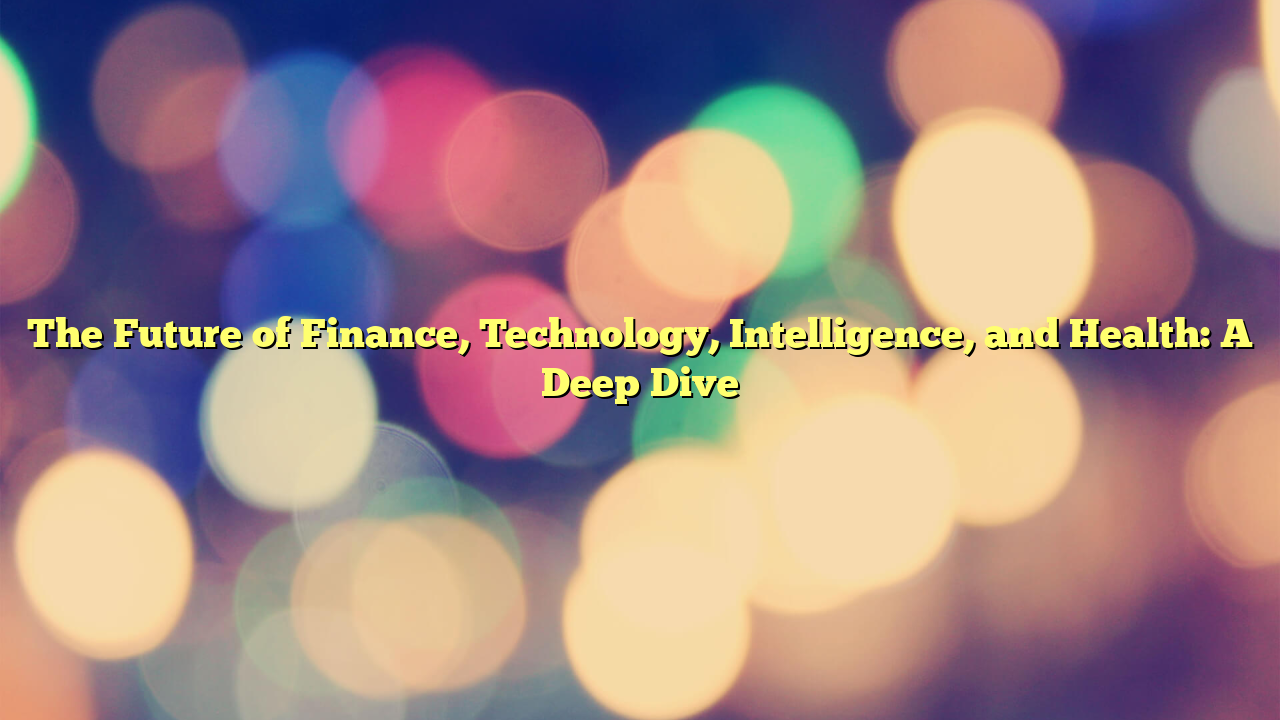In recent years, the intersection of technology, finance, and health have been evolving rapidly, with each industry shaping the others in profound ways. The advancements in technology, especially in AI and machine learning, have brought about transformative changes that are improving both financial markets and healthcare systems across the globe. These changes are making it more possible to address health issues, optimize financial decision-making, and create new opportunities for innovation.
This article explores the connections between the four key sectors, focusing on how advancements in technology, including AI, impact these fields. By examining these areas in-depth, we can understand the potential for future advancements and their implications for the economy, the healthcare system, and individual well-being.
Technology and Finance: A Revolution in Financial Markets
One of the most significant areas where technology has had an impact is in finance. The emergence of cryptocurrencies, mobile banking, and fintech solutions has dramatically changed how financial institutions operate. Technology has also improved the ability of businesses to make quick, data-driven decisions through algorithms and machine learning models.
One of the most noteworthy innovations is blockchain technology. Originally designed as the backbone of cryptocurrencies like Bitcoin, blockchain has been adapted for use in many other areas of finance. It provides a secure, decentralized ledger that can be used for everything from cross-border payments to managing contracts and reducing fraud. Blockchain is also being used for enhancing payment systems and simplifying transaction processes, improving the efficiency of financial services across the globe.
In addition to blockchain, artificial intelligence (AI) is transforming financial institutions. AI tools are now being used to predict market trends, automate customer service through chatbots, and optimize portfolios with deep learning. These tools help investors, analysts, and banks make quicker, more accurate decisions, improving the overall efficiency of the financial ecosystem. The future of finance is increasingly driven by these intelligent systems, and it has led to a wave of innovation in financial products and services.
AI and Intelligence: Changing How We Learn, Work, and Solve Problems
In addition to its impact on finance, artificial intelligence is changing the landscape of intelligence and learning. AI systems, powered by complex machine learning models, have begun to revolutionize fields like education, healthcare, and decision-making. By processing Gerhanatoto of data at speeds far beyond human capability, AI is enhancing human intelligence by providing actionable insights that were previously difficult or impossible to achieve.
For instance, AI is playing a major role in advancing personalized education. Adaptive learning platforms use data to tailor lesson plans to individual students’ strengths and weaknesses, enabling more effective learning. This is particularly beneficial in educational settings where traditional teaching methods may fail to address diverse learning styles. In the workforce, AI has streamlined operations and decision-making, giving professionals tools to analyze data, anticipate market conditions, and improve overall productivity.
AI’s influence is not just limited to education and the workforce—it has a profound effect on research. In areas like drug discovery, AI can process vast datasets from medical research to identify potential treatments for diseases more efficiently. By predicting how certain compounds might interact with the body, AI is accelerating the development of life-saving medications. This not only speeds up research but can also save lives by making breakthroughs happen faster.
Health and Technology: Innovations Revolutionizing Healthcare
Technology has similarly made incredible strides in the healthcare sector. Innovations such as telemedicine, wearable devices, and AI-based diagnostics have significantly changed the way healthcare is delivered and managed. Through these advancements, healthcare systems are becoming more efficient, personalized, and accessible.
Telemedicine, for example, allows patients to consult with doctors remotely, making healthcare more accessible, especially in rural or underserved areas. It also helps reduce the strain on hospitals and clinics by offering a means to handle non-urgent consultations. This is especially valuable in times of crisis, like the COVID-19 pandemic, when in-person visits could be dangerous.
Wearable technology is another key area transforming healthcare. Devices like smartwatches and fitness trackers can monitor vital signs in real-time, such as heart rate, sleep patterns, and physical activity. These devices provide individuals with valuable information about their health, enabling them to make informed decisions about their well-being. Health insurance companies are also leveraging these devices to promote wellness and reduce healthcare costs by incentivizing healthy habits.
Moreover, AI plays a crucial role in diagnostics. Through machine learning, AI systems are trained to recognize patterns in medical images, such as X-rays and MRIs, with remarkable accuracy. In fact, AI is already being used to detect conditions like cancer, pneumonia, and heart disease at early stages, allowing for quicker intervention and improving patient outcomes. AI-powered diagnostics are also helping doctors save time by automating routine tasks, allowing them to focus more on patient care.
The Future: Integrating AI, Finance, Healthcare, and Intelligence
Looking ahead, the integration of technology, finance, health, and intelligence is likely to increase. As AI and machine learning continue to evolve, we can expect even greater advances in financial systems, healthcare services, and the way people learn and work. The collaboration between these sectors will lead to more innovative solutions to global challenges, whether it’s managing economic uncertainty, improving public health, or addressing education gaps.
For example, the fusion of AI with finance and healthcare could lead to personalized financial plans that are tailored to an individual’s health needs. By analyzing medical history and predicting future healthcare costs, AI can help create financial strategies that ensure people can afford the healthcare they need throughout their lives. Similarly, advances in AI-driven healthcare can help individuals make better lifestyle choices, leading to healthier populations and, in turn, a more robust economy.
Moreover, as AI systems become more advanced, we may see the rise of smart cities where technology, including AI, is integrated into the infrastructure to enhance the quality of life for citizens. Smart healthcare systems will be able to predict outbreaks and address public health issues before they become widespread, and financial systems will be able to react quickly to economic shifts, benefiting both individuals and businesses.
Conclusion: The Convergence of Technology, Finance, Health, and Intelligence
In conclusion, the future of technology in finance, healthcare, and intelligence is undeniably interconnected. The collaboration between these sectors has already led to remarkable advancements, and as technology continues to evolve, these industries will work more closely together to create a future that is healthier, more efficient, and more equitable. By leveraging AI and other technological innovations, we are not only solving problems but also paving the way for a smarter, more sustainable world.
As these innovations continue to reshape the landscape, the opportunities to enhance the quality of life through financial stability, improved health outcomes, and intelligent decision-making are limitless. The only question that remains is how fast we can adapt and take advantage of these new possibilities.
Exploring the Future of Intelligence, Technology, and Health in Finance


